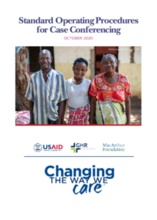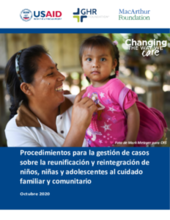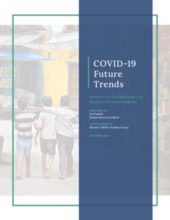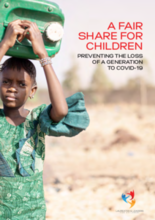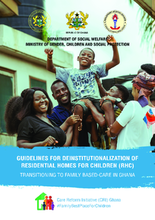Demographic Data
|
Sources: World Bank, UNDP, UNAIDS, DHS 2013 |
Displaying 3421 - 3430 of 14390
The purpose of this Standard Operating Procedure (SOP) is to provide a standard and consistent approach to case conferencing as part of a comprehensive case management approach utilized during decision-making processes for children. The SOPs should be utilized by institutions (e.g. Charitable Children’s Institutions, or CCIs) and organizations as well as other actors engaged in decision-making around children’s care and protection.
Los Procedimientos de Manejo de Casos para la Reunificación y Reintegración de los Niños, Niñas y Adolescentes al cuidado Familiar y Comunitaria se desarrollaron a través de talleres participativos en conjunto con la Secretaría de Bienestar Social (SBS), la Procuraduría de la Niñez y la Adolescencia (PNA) de la Procuraduría General de la Nación (PGN), El Organismo Judicial (OJ), El Consejo Nacional de Adopciones (CNA), la Asociación de Hogares Cristianos de Guatemala (ASOCRIGUA) y Hogar Aldeas de Esperanza. Se basó en el trabajo de Changing the Way We Care de Kenia en la Guía para trabajadores sociales: Manejo de casos para la reintegración de niños y niñas en cuidado familiar o comunitaria, adaptada al contexto guatemalteco.
In attempts to delineate the future impacts on today's children, this paper analyses the COVID-19 crisis as a dynamic phenomenon that shapes children's lives well into adulthood, with age and gender considered key influencing factors. It examines the impacts from previous crises and the available data to build prudent assumptions about the present situation and outlines four scenarios which provide opportunities to identify potential levers for positive change.
Desde os primeiros anos de independência nacional, em 1975, o objectivo central da política educativa de Moçambique tem sido o de assegurar que todas as crianças em idade escolar tenham acesso à escola e nela permaneçam até concluírem a educação b
This report calls on world leaders to come together and agree a global package to help low income countries and ensure the most vulnerable to the COVID-19 crisis receive at least some support.
This research explores the stress children in World Vision programmes in the Middle East and Eastern Europe region are under due to COVID-19.
This document is aimed at complementing the Standard Operating Procedures (SOPs) for Licensing, Monitoring and Closure of Residential Homes for Children (RHC) by supporting the implementation of the closure of RHCs that have not been licensed or do not meet the standards in the SOPs.
No reconocimiento de Kafala constituida entre ciudadanos marroquíes a efectos de adopción. Antecedentes y alcance de la prohibición contenida en el artículo 19.4 de la Ley de adopción internacional.
This Russian language Compendium documents UNICEF’s social policy interventions in Europe and Central Asia from 2014-2020 and includes 18 case studies from 15 different countries as well as stories from the field.
This report presents findings from a survey conducted across the Europe and Central Asia Region which aimed to enhance understanding of the use of digital platforms for child protection.

